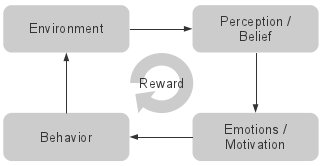What is purpose? How do I create more purpose in my life?
The past few posts have covered two concepts under my name at the top of this blog — values and meaning. On to purpose.
As with values and meaning I want to ground an important but nearly always vaguely used and defined concept in simple, understandable terms. As with values and meaning, purpose describes not things or actions, but something more about the feelings related to such things.
For example, learning is an action. Learning with a purpose means learning in a different way. Describing doing anything as with a purpose or purposefully describes your mental state. You can observe the difference between how someone behaves when with a purpose versus when not. That’s the effect of the cause — your emotional state.
Purpose means conscious awareness of and agreement with the emotions motivating you.
The opposite of purpose, or close to it, is acting reactively — that is, without intent or knowledge of your intent. It’s the opposite of leadership, since it follows other people or the whims of your environment.
I hope you’re seeing a theme with this third concept that many otherwise abstract and philosophical concepts boil down to emotions. The more you understand emotions in general, your emotional system, and your emotions specifically, the more these concepts will make sense. Vague or abstract philosophical concepts will distract you less from a life of creating the emotions you like through the things that create the important ones — family, community, enjoying yourself, learning, growing, and the like.
Likewise, the less you understand emotions, the more you’ll be distracted by concepts that seem highfalutin or grand but actually just describe things based in emotion.
Doing something with a purpose means you know your motivations. If you don’t mind using my Model for your emotional system, we see our motivations are based in our environments, perceptions, beliefs, and behaviors.
 So to be more precise, purpose means 1) knowing how your environment, perception, beliefs, and behaviors are contributing to your motivations and 2) agree with how your emotions are motivating you. When that happens, that emotional cycle brings you reward, meaning you’ll like doing it and you’ll want to do it again. You’ll probably have higher expectation of success, meaning you’ll feel more motivation.
So to be more precise, purpose means 1) knowing how your environment, perception, beliefs, and behaviors are contributing to your motivations and 2) agree with how your emotions are motivating you. When that happens, that emotional cycle brings you reward, meaning you’ll like doing it and you’ll want to do it again. You’ll probably have higher expectation of success, meaning you’ll feel more motivation.
As with values and meaning, the better you understand your emotional system and your emotions, the more you’ll be able to create purpose in your life, act with purpose, and understand others’ purposes.
If you wonder what your or anyone’s purpose is in doing something, start by understanding their environment, how they perceive it, their beliefs, and how they’re behaving. Their behavior will make sense in the context of their environment as they perceive it, subject to their beliefs. That’s what their emotional system acts on, so that’s their purpose.
If you don’t know those things you’ll generally have to guess at some of their purpose. You won’t communicate with them or understand them as meaningfully.
If you don’t know why you’re doing something — you don’t have or know your purpose — understand those elements of your emotional cycle. If you don’t understand some element, work at understanding it. When you do, you’ll understand your purpose.
And you’ll improve your life.
Other people’s purposes
You can understand other people’s purposes the same way you understand their values. I wrote about that a couple days ago.
Read my weekly newsletter

On initiative, leadership, the environment, and burpees
Pingback: What is leadership? » Joshua Spodek